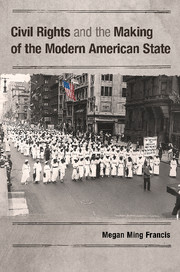Book contents
- Frontmatter
- Dedication
- Contents
- List of Figures and Table
- Illustrations
- Acknowledgments
- Abbreviations
- 1 Rethinking Civil Rights and American Political Development
- 2 The Birth of the NAACP, Mob Violence, and the Challenge of Public Opinion
- 3 The Unsteady March into the Oval Office
- 4 Anti-Lynching Legislation and the Sinking of the Republican Ship in Congress
- 5 Defending the Right to Live
- 6 Civil Rights Bound
- Appendix Manuscript Sources
- Bibliography
- Index
- References
3 - The Unsteady March into the Oval Office
Published online by Cambridge University Press: 05 June 2014
- Frontmatter
- Dedication
- Contents
- List of Figures and Table
- Illustrations
- Acknowledgments
- Abbreviations
- 1 Rethinking Civil Rights and American Political Development
- 2 The Birth of the NAACP, Mob Violence, and the Challenge of Public Opinion
- 3 The Unsteady March into the Oval Office
- 4 Anti-Lynching Legislation and the Sinking of the Republican Ship in Congress
- 5 Defending the Right to Live
- 6 Civil Rights Bound
- Appendix Manuscript Sources
- Bibliography
- Index
- References
Summary
There have been many lynchings and every one of them has been a blow at the heart of ordered law and humane justice. No man who loves America, no man who really cares for her fame and honor and character, or who is truly loyal to her institutions, can justify mob action while the courts of justice are open and the governments of the States and the Nation are ready and able to do their duty.
– President Woodrow Wilson, July 26, 1918Congress ought to wipe the stain of barbaric lynching from the banners of a free and orderly, representative democracy.
– President Warren G. Harding, April 12, 1921At an early stage in the NAACP’s movement against racial violence, the organization targeted the executive branch as a possible institution in the federal government whereby a civil rights agenda could be entrenched. Of course, the president, the highest political office in the United States, has often appeared off-limits to marginalized groups, as the obstacles to gain the ear of the president are often insurmountable, and the likelihood of success is lower than with other branches in government. However, in two successive presidential administrations, the National Association for the Advancement of Colored People (NAACP) garnered unprecedented access to the Oval Office and secured presidential denouncements of lynching and mob violence. President Woodrow Wilson conceded to NAACP demands during his second term, and President Warren G. Harding complied with NAACP requests for a strong statement against lynching as soon as he assumed office. The statements by Wilson and Harding admonishing lynchings are particularly remarkable because both came from men who initially expressed an unwillingness to publicly address the issue. How did the NAACP push the issues of lynching and mob violence onto the presidential agenda? Furthermore, how did the idea of lynching as antithetical to a healthy democracy become recognized as persuasive and powerful in the Oval Office? And finally, why did the NAACP consider a presidential statement as a necessary step in the march toward racial equality in the first quarter of the twentieth century? To answer these questions, this chapter unveils how the NAACP transformed the realm of what was possible in the presidential administrations of Wilson and Harding.
- Type
- Chapter
- Information
- Civil Rights and the Making of the Modern American State , pp. 59 - 97Publisher: Cambridge University PressPrint publication year: 2014



